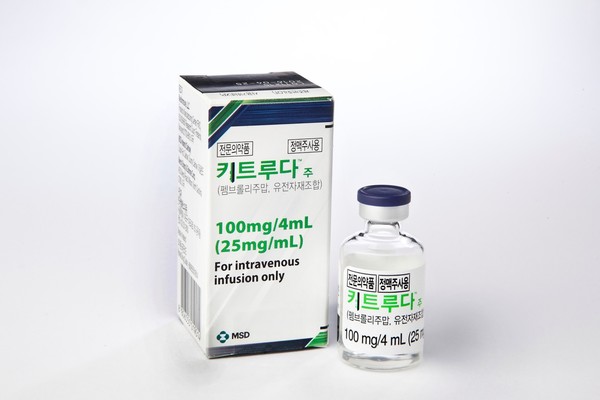MSD Korea celebrated expanded insurance benefits for its anti-PD-1 immuno-cancer drug, Keytruda, for the secondary treatment of bladder cancer patients who failed in platinum-containing chemotherapy treatments in an online news conference Tuesday.

In a presentation titled "UC (You see) more tomorrows with Keytruda," Professor Park In-keun of Oncology at Asan Medical Center explained Keytruda’s treatment benefits in metastatic bladder cancer by releasing the clinical results and referencing the NCCN guidelines. Kim Yo-han, managing director of the MSD’s medical department, followed Professor Park, painting a picture of the future urinary cancer (UC) patients can have with Keytruda.
Metastatic epithelial cell carcinoma (urothelial carcinoma) derived from urinary epithelial cells in direct contact with urine accounts for most urinary cancers. Unfortunately, urinary cancer is characterized by frequent recurrence and metastasis. The five-year survival rate of remote metastatic patients in Korea is only about 9 percent, less than half of all cancers.
Despite the high mortality rate in the metastatic stage, the treatments currently developed have not significantly reduced the mortality rate of urinary cancer.
Besides, chemotherapy has side effects causing cell damage, and if platinum-based primary chemotherapy fails, the choice of secondary treatment drugs is limited, requiring a widely used treatment.
"In the past, many patients gave up treatment due to complications and toxicity problems,” Professor Park said. “However, Keytruda demonstrates a higher treatment effect than chemotherapy."

This reimbursement expansion was based on phase 3 clinical trial results. Keytruda reduced the risk of death compared to the chemotherapy group by about 30 percent in patients with local progressive or metastatic urinary epithelial cancer who failed platinum-based treatment. The Keytruda group also demonstrated a superior 10.1-month survival over chemotherapy (7.3 months). Additionally, the objective response rate (ORR) of the Keytruda group was 21.1 percent, nearly double the chemotherapy group’s 11 percent, according to Professor Park.
He added that this is significant as the duration of response (DOR), an indicator of how long a patient will respond to treatment without tumor growth or metastasis, did not reach the median value.
"Keytruda is the only treatment recommended by the NCCN guideline as a secondary treatment option for bladder cancer and has already proven its effectiveness in clinical and actual treatment sites," Professor Park said. "This opportunity increases access to global standard treatment, reducing the burden on many patients in Korea."
Managing Director Kim introduced MSD’s research and development efforts to provide hope for UC patients.
"Currently, Keytruda has been approved by the Ministry of Food and Drug Safety (MFDS) for 21 indications of 15 cancer species, of which three are in urinary tract epithelial carcinoma, and two are in renal cell carcinoma,” Kim said.
He added that the company is committed to improving treatments for UC patients with the ongoing clinical trials and plans for additional clinical trials for early-stage cancer patients and discovering different pipelines and biomarkers with Keytruda.
MSD Korea CEO Kevin Peters also said in his opening speech, "We are very pleased to inform patients and medical workers frustrated from the absence of suitable UC treatment options of registering for Keytruda's secondary treatment reimbursement."

